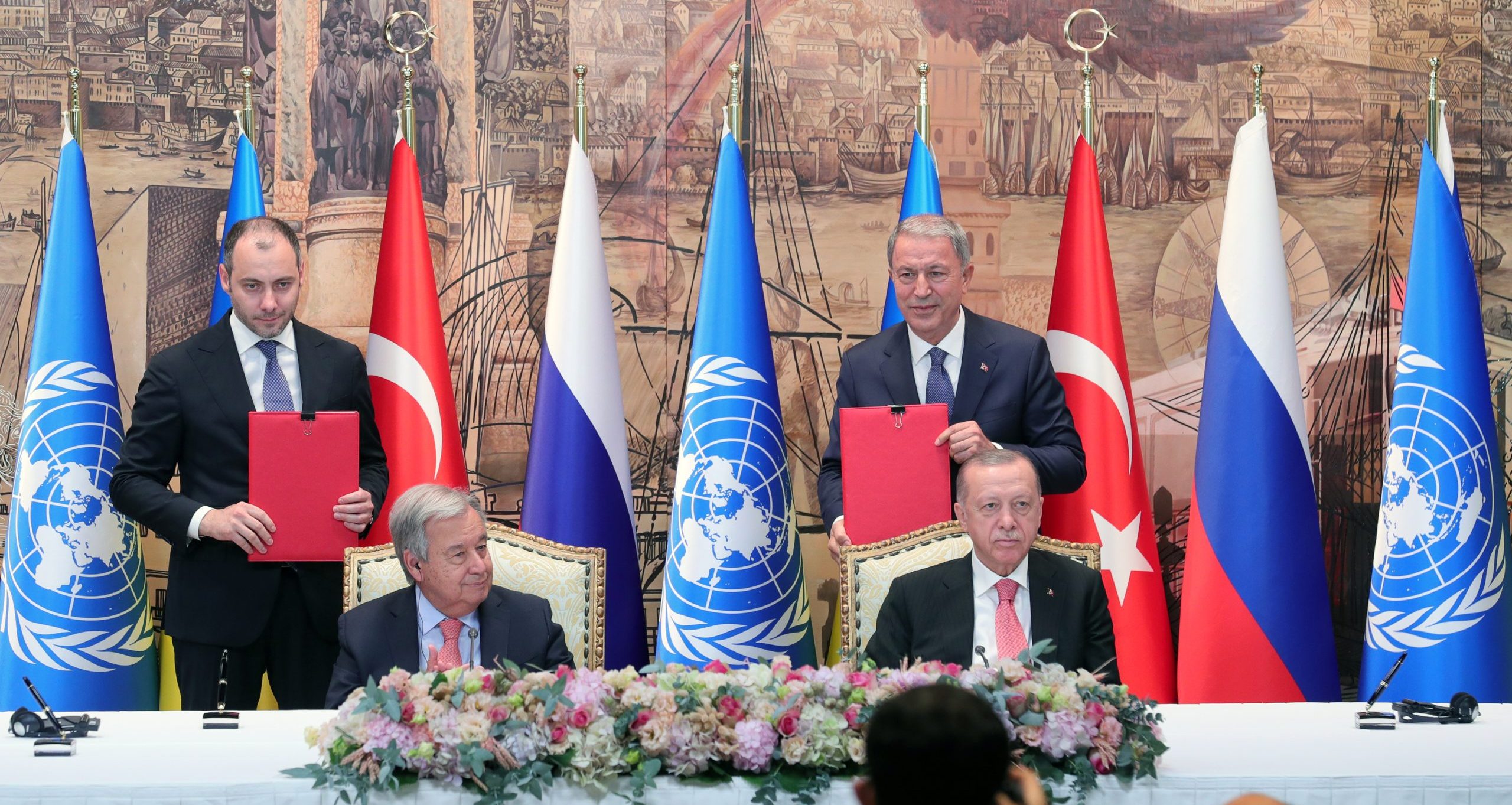Civillian casualties in Ukraine surpassed 10,000, with more than 4,500 people killed since the start of the Russian invasion.
Qatar welcomed an agreement signed between Russia and Ukraine to resume grain and fertiliser exports on Friday, describing it as “a step in the right direction” to address global food shortages.
The Gulf state’s foreign ministry said on Saturday that it hopes the agreement would “be a step on the way to peacefully resolve the Russian-Ukrainian crisis”, lauding Turkey and the UN’s efforts in brokering the accord.
The identical agreement was signed separately by Russia’s Defence Minister Sergei Shoigu and Ukraine’s Infrastructure Minister Oleksandr Kubrakov as Ukrainian officials refuse to be involved in a single document with Russians.
“Ukraine doesn’t trust Russia. I don’t think anyone has reasons to trust Russia. We invest our trust in the United Nations as the driving force of this agreement,” said Kyiv’s Foreign minister Dmytro Kuleba.
This comes as the Russian invasion of Ukraine persists five months on, launched by Moscow on 24 February this year.
By signing the four-month deal, the conflicting countries agree on resuming grain shipments to tackle the impact of global food shortages, given Russia and Ukraine’s positions as some of the world’s largest grain exporters.
The landmark deal is subject to renewal unless the war ends. It will also pump wheat, sunflower, oil, fertiliser and other goods into world markets.
“With the ship traffic that will start in the coming days, we will open a new breathing tube from the Black Sea to many countries of the world,” said Turkish President Recep Tayyip Erdogan.
The agreement entails the reopening of the blocked Black Sea routes, which has caused Ukrainian exports to drastically drop and pushed a spike in global grain prices. The accord seeks to return the total exports to their pre-war level of five million metric tonnes per month, as Reuters reported.
According to the UN World Food Programme (WFP), at least 47 million people are facing “acute hunger” amid fears of a global food crisis as long as Ukraine’s exports are blocked.
“De facto ceasefire”
Negotiations over the deal commenced in April after the idea was proposed by UN Secretary-General Antonio Guterres in separate discussions with Russian President Vladimir Putin and Ukraine’s President Volodymyr Zelenskiy.
Shipments are set to be facilitated through a Joint Control Center (JCC) in Istanbul, overseen by officials from the signatories of the agreement. The ships can safely transit the Black Sea to Turkey’s Bosphorus strait before reaching global markets.
The UN and Russia also inked a memorandum of understanding enabling the former to facilitate the global markets’ access to Moscow’s fertiliser.
The deal would ensure the safe passage of ships in and out of Odesa along with other Ukrainian ports, resembling what Reuters described as a “de facto ceasefire”.
With Ukrainian ports requiring at least 10 days to prepare for exports, the agreement could take time to be implemented.
In the event of a breach of the maritime truce, the JCC would work on resolving the issue, according to a statement provided to Reuters by a UN official.
However, Russian missiles struck the southern port of Odesa on Saturday, just a day after the signing of the agreement, without causing significant damage.
“Unfortunately there are wounded. The port’s infrastructure was damaged,” said Odesa region governor Maksym Marchenko.
President Zelenskiy described the attack as an act of “barbarism” though Russian officials denied involvement in the air strike. Russia’s defence ministry also did not reply to Reuters’s request for a comment.
“If anyone in the world could have said before this that some kind of dialogue with Russia, some kind of agreements, would be necessary, look at what is happening,” added Zelenskiy.
Meanwhile, US Secretary of State Antony Blinken said the attack “casts serious doubt of the credibility of Russia’s commitment” to the recent deal.
“Russia bears responsibility for deepening the global food crisis and must stop its aggression,” added Blinken.
According to the UN, civillian casualties in Ukraine surpassed 10,000, with more than 4,500 people killed since the start of the Russian invasion.
Qatar has repeatedly stressed the need for the Russian and Ukrainian sides to reach a political agreement.
“We are all aware that crises and wars in any region affect the entire world. The war in Ukraine has direct and indirect victims. This war has contributed to exacerbating an economic crisis that may lead to humanitarian disasters,” said Qatar’s Amir Sheikh Tamim bin Hamad Al Thani last week.







